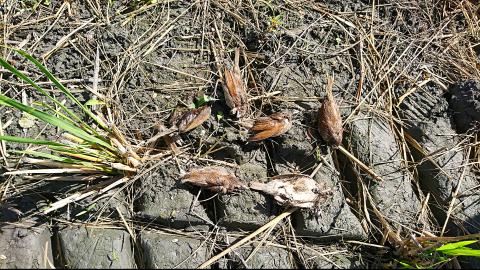A powerful pesticide is to blame for the death of an estimated 1,200 birds in Beinan Township (卑南), the Taitung County Animal Disease Control Center said on Wednesday.
The mass bird mortality, which occurred on Jan. 5 and 6, was first reported on Facebook by an organic farmer, who said that others in the area might be poisoning the birds.
The report sparked concern among local and national conservation groups, including the Taitung Wild Bird Society and the Taiwan Association for Falconry Culture and Raptor Conservation.

Photo: CNA
An examination found that rice in the stomachs of the birds contained high residual levels of carbofuran, one of the most toxic pesticides available on the market, which was ruled to be the cause of death, the center said in a statement.
A subtype of carbamate pesticides, carbofuran is most commonly used to control insects at newly planted rice or vegetable fields, the center said.
Officials did not rule out the possibility of intentional poisoning and the Seventh Special Police Corps was advised to investigate the incident, Taitung Department of Agriculture Director Hsu Jui-kui (許瑞貴) said.
The Council of Agriculture on Jan. 1 banned four types of carbofuran products due to concerns about their toxicity, the Taitung District Agricultural Research and Extension Station said.
“This office believes that a pesticide user or users have failed to apply the recommended dilution ratio on the label of all licensed carbofuran products, which led to the senseless deaths of the birds,” the station said.
Wu Chia-wen (吳嘉文), the officer in charge of the Seventh Special Police Corps in Taitung, confirmed that an investigation is ongoing, but added that local farmers interviewed by the unit had denied using the pesticide.
The Council of Agriculture had said the previous evening that 3 percent-concentration pellets are the only acceptable carbofuran product for use in rice paddies and farmers who use illegal pesticides could be fined up to NT$150,000.

CAUTION: Based on intelligence from the nation’s security agencies, MOFA has cautioned Taiwanese travelers about heightened safety risks in China-friendly countries The Ministry of Foreign Affairs (MOFA) yesterday urged Taiwanese to be aware of their safety when traveling abroad, especially in countries that are friendly to China. China in June last year issued 22 guidelines that allow its courts to try in absentia and sentence to death so-called “diehard” Taiwanese independence activists, even though Chinese courts have no jurisdiction in Taiwan. Late last month, a senior Chinese official gave closed-door instructions to state security units to implement the guidelines in countries friendly to China, a government memo and a senior Taiwan security official said, based on information gathered by Taiwan’s intelligence agency. The

The National Immigration Agency (NIA) said yesterday that it will revoke the dependent-based residence permit of a Chinese social media influencer who reportedly “openly advocated for [China’s] unification through military force” with Taiwan. The Chinese national, identified by her surname Liu (劉), will have her residence permit revoked in accordance with Article 14 of the “Measures for the permission of family- based residence, long-term residence and settlement of people from the Mainland Area in the Taiwan Area,” the NIA said in a news release. The agency explained it received reports that Liu made “unifying Taiwan through military force” statements on her online

Taiwan Semiconductor Manufacturing Co (TSMC), the world’s largest contract chipmaker, said yesterday that it is looking to hire 8,000 people this year, at a time when the tech giant is expanding production capacity to maintain its lead over competitors. To attract talent, TSMC would launch a large-scale recruitment campaign on campuses across Taiwan, where a newly recruited engineer with a master’s degree could expect to receive an average salary of NT$2.2 million (US$60,912), which is much higher than the 2023 national average of NT$709,000 for those in the same category, according to government statistics. TSMC, which accounted for more than 60 percent

Tung Tzu-hsien (童子賢), a Taiwanese businessman and deputy convener of the nation’s National Climate Change Committee, said yesterday that “electrical power is national power” and nuclear energy is “very important to Taiwan.” Tung made the remarks, suggesting that his views do not align with the country’s current official policy of phasing out nuclear energy, at a forum organized by the Taiwan People’s Party titled “Challenges and Prospects of Taiwan’s AI Industry and Energy Policy.” “Taiwan is currently pursuing industries with high added- value and is developing vigorously, and this all requires electricity,” said the chairman